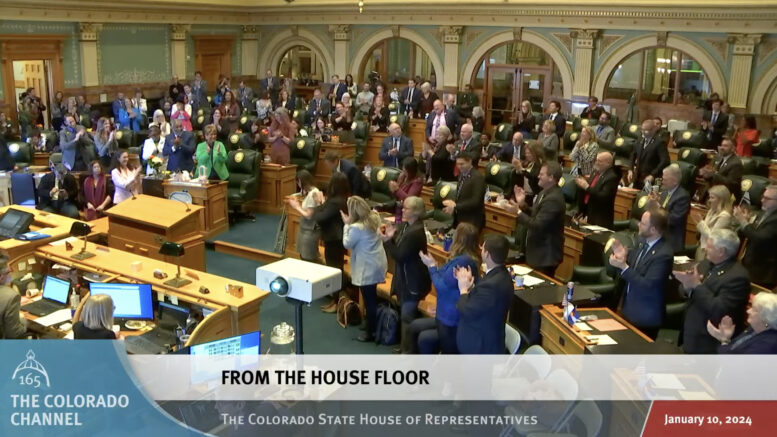Though Colorado’s legislative leaders remained traditionally vague on their strategic priorities during opening-day speeches Wednesday, Democrats emphasized themes of housing affordability, workforce development, environmental protection — and decorum.
Republican leaders, once again facing historic deficits in both the House and Senate, used their orations on the first day of the 120-day session to plead with Democrats for restraint, particularly on regulatory issues. But they joined their colleagues across the aisle in vowing efforts to seek relief from high costs of living, setting the parties on a course to see whether they can travel similar roads to try to get to the same goal.
While the General Assembly has what Senate President Steve Fenberg, D-Boulder, called a “long … list of goals we hope to accomplish,” much of the opening-day addresses from him and House Speaker Julie McCluskie, D-Dillon, centered on the need for increased civility at the Capitol. Two Democratic legislators resigned last month, citing the vitriolic atmosphere in the Legislature, and McCluskie has reprimanded both a Democratic (Elisabeth Epps) and Republican (Scott Bottoms) representative over the past five months because of their behaviors.
Pleas for increased decorum
Leaders universally identified social media as a culprit to the increasing lack of discourse and implored members to reach out and get to know each other through face-to-face interactions. They called on legislators to rise above what Senate Minority Leader Paul Lundeen, R-Monument, termed the “obstreperous behavior outside this chamber,” just hours after House and Senate business came to a halt 39 minutes into the session as shouting pro-Palestinian protestors were removed from the House chamber.
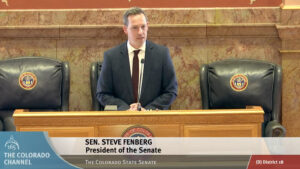
Colorado Senate President Steve Fenberg delivers remarks on opening day Wednesday.
“Too often our words and actions breed cynicism, feed hate for those we disagree with and encourage more yelling and less listening,” the term-limited Fenberg told the Senate in his final opening-day address. “We must resist the urge to be performers. We must remind ourselves that to be a caretaker of this institution, we need to legislate for constituents, not for Twitter.”
Once the leaders got down to listing their goals for the session, only the creation of more affordable housing made it into speeches of both Republicans and Democrats. And even then, it became immediately clear that the parties have different ideas of how to address it.
Housing a big topic on opening day
McCluskie advocated for a three-part strategy resurrecting key tenets of Gov. Jared Polis’ failed 2023 land-use-reform bill — helping local governments do housing assessments, legalizing accessory dwelling units and building more multifamily housing along transit corridors. But she added that her preferred package also “incentivizes local governments to preserve housing stock Coloradans can afford” — a reference to revive a bill vetoed last year by Polis that would have given cities and counties a right of first refusal on apartment complexes that go up for sale.
Lundeen, meanwhile, was the only of the chamber leaders to call for construction-defects reform to be a part of the affordable-housing solution, even though two Democrats will sponsor the coming bill that seeks to reduce lawsuits aimed at new condominiums. While the state is pumping hundreds of millions of dollars into growing its stock of workforce housing, condominium developers are being scared away from Colorado by its laws and must be enticed back if the state is to diversify its housing options, he said.
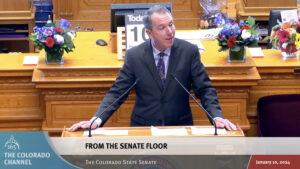
Colorado Senate Minority Leaders speaks on opening day of the 2024 legislative session Wednesday.
“These laws promote litigation, stifling the construction of much-needed for-sale multi-family housing,” Lundeen said. “The solution to affordable housing necessitates hundreds of billions of dollars of investment, which are currently flowing into homes in other states.”
Workforce and property taxes
Both McCluskie and Fenberg called for more money to be put to workforce development at a time when business operators continue to struggle to find enough skilled talent to expand their operations. McCluskie referenced existing efforts of businesses, chambers of commerce and education institutions to create career pathways and said state government must “continue to partner with these leaders to create an economy for all,” seemingly foreshadowing support for some of Polis’ announced workforce agenda.
The Democratic leaders also dually noted the need for more property tax relief following voters’ rejection of Proposition HH in November and the subsequent passage at a special session of a bill to give limited help to homeowners but none to commercial property owners. Fenberg said the goal this year is for creation of long-term solutions, and he called upon the recently formed Commission on Property Tax to “make recommendations on delivering relief without shortchanging essential local services.”
Only Fenberg hit extensively on the issue of transportation, and in doing so he specifically called for steps to bring to reality a long-discussed Front Range passenger-rail system that can be the backbone of a statewide transit system. McCluskie, meanwhile, discussed water issues, saying the Legislature both must put more regulation in place for waterways left unprotected following the U.S. Supreme Court’s recent Waters of the United States decision and must secure water for future generations of state residents.
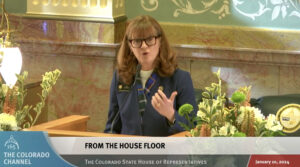
Colorado House Speaker Julie McCluskie offers remarks on opening day of the 2024 legislative session Wednesday.
McCluskie also spent several minutes extolling the need for further environmental protections, specifically for people living in disproportionately impacted communities that feature higher rates of poverty and higher percentages of residents of color. A committee studying ozone pollution spoke this past off-season of boosting air-quality permitting regulations for drilling and emitting operations around these areas, and McCluskie’s words likely presage a coming debate over what are reasonable restrictions and what go too far.
Regulatory debates begin on opening day
“We cannot bury our heads in the sand with junk science and climate denialism while our neighbors face chronic health conditions from air pollution, annual wildfire evacuations, agricultural losses and the erosion of our future,” McCluskie said. “It will continue to be a top priority for us to improve our air quality, crack down on harmful emissions and increase transit options to protect the future of this state.”
Those comments stood in contrast to arguments from Republicans that business owners, in the words of House Minority Leader Mike Lynch, R-Wellington, “feel they are overtaxed and overregulated.” Lundeen pointed in his speech to a 2023 Colorado Chamber of Commerce survey that found regulations are the top obstacle to business expansion, and he warned that legislators need a gentle hand in crafting further rules for fear of driving jobs out of the state.
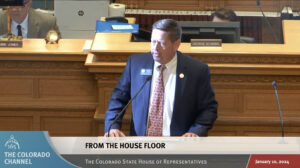
Colorado House Minority Leader Mike Lynch speaks on opening day of the 2024 legislative session on Wednesday.
“The future of our state, the prosperity of our people and the survival of our small businesses are all hanging in the balance,” Lundeen said. “It is our solemn duty to provide relief to the people and businesses of Colorado.”
Polis will offer his annual State of the State Address to the Legislature at 11 a.m. Thursday. Then, by next week, the General Assembly is expected to begin debating some of the earliest bills of the 2024 session.
